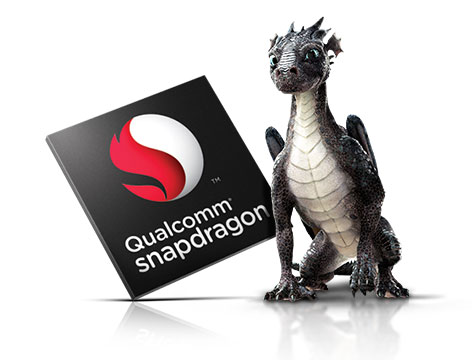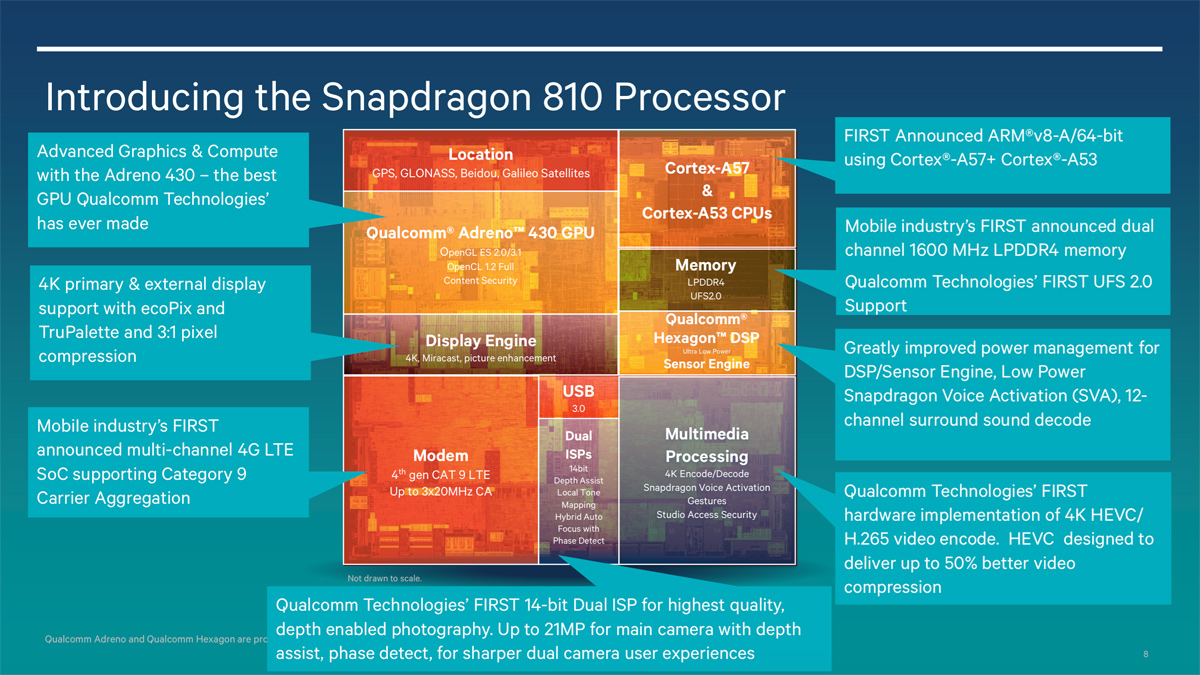Snapdragon 810 Performance Preview
Qualcomm’s first 64-bit SoC is finally here, but swirling rumors about overheating and poor memory performance continue to smolder. Will the Snapdragon 810 burn up our benchmark charts or just go up in smoke?
Rumors And Speculation
Qualcomm’s Snapdragon family of SoCs have enjoyed a great deal of success, particularly in the North American market. Nearly every flagship smartphone from last year—LG G3 and Sony Z3, Galaxy S5 and Nexus 6, HTC One and OnePlus One—shipped with a Snapdragon 800 series SoC. With this kind of momentum, Qualcomm’s latest addition to the family, Snapdragon 810, should be a hot commodity amongst smartphone OEMs.
If rumors are to be believed, then the 810 is indeed heating things up, just not in the way Qualcomm expected. The first rumor surfaced in early December from an unnamed Korean industry source stating that the 810 “overheats when it reaches a specific voltage,” has performance issues with its memory controller, and has an error in the GPU driver. Anonymous rumors like this usually fade into the background noise; however, this one garnered enough attention that LG, who is using the 810 in the recently announced G Flex 2, specifically addressed the overheating concern. Woo Ram-chan, LG vice president for mobile product planning, stated "I am very much aware of the various concerns in the market about the 810, but the chip's performance is quite satisfactory," adding, “I don't understand why there is a issue over heat.”
LG might not be feeling the heat, but Samsung apparently got so hot and bothered while testing the SoC that it dropped the 810 from the upcoming Galaxy S6. This design change was all but confirmed by Qualcomm in its Q1 fiscal 2015 earnings statement, where “Expectations that our Snapdragon 810 processor will not be in the upcoming design cycle of a large customer’s flagship device” were partly to blame for lowering its revenue outlook for the semiconductor business in the second half of this year. The Wall Street Journal even reported that Qualcomm is creating an updated version of the 810 for Samsung that should be ready in March.
Even if the Samsung rumors are true, it doesn’t necessarily mean there’s anything wrong with the 810. Samsung traditionally uses Snapdragon SoCs for the North American version of its handsets and its own Exynos SoCs for the international version. The Exynos 7420, which should appear in at least some, if not all, Galaxy S6 handsets, uses the same big.LITTLE octa-core combination of ARM Cortex-A57 and -A53 CPUs as the Snapdragon 810 and is supposed to be manufactured on a similar 20nm process. However, the president of Samsung's semiconductor business, Kim Ki-nam, has stated that Samsung’s foundry is already producing chips on its new 14nm FinFET process for unspecified clients. If Samsung can move the Exynos 7420 to this new process, it would be able to achieve a much higher clock speed than the otherwise similar 810. In order for Samsung to maintain performance parity between the two different versions of the S6 (assuming these are the two SoCs it wanted to use), it would either need to underclock its 7420 or push the 810 beyond what its 20nm process allowed, causing it to overheat.
So, the overheating rumors could just be a bunch of smoke. But what about the issue with memory performance? We recently ran several benchmarks on a device using the 810 SoC and observed rather low memory performance values. Digging a little deeper we discovered that the device was actually a pre-production unit, and then confirmed with Qualcomm that pre-production samples were running the memory bus at half-speed. While this sounds alarming, it’s actually quite common when working with a new type of memory—LPDDR4 in the case of the 810.
It’s safe to say that the newest Snapdragon has encountered some engineering challenges, but has Qualcomm solved these issues or is the 810 flawed? Just recently, Qualcomm posted a press release stating that there are “over 60 premium tier mobile devices based on the Snapdragon 810 coming to market.” Two such devices have officially been announced: the LG G Flex 2 and Xiaomi’s Mi Note Pro. Other OEMs have also expressed their confidence in the new SoC, including Microsoft, Oppo, Sony, and Motorola Mobility, whose president Rick Osterloh, stated “The Snapdragon 810 processor will enable us to push the boundaries even further.” If the 810 had serious performance issues, it’s unlikely it would elicit such praise.
Data speaks louder than words however. After examining the 810’s architecture and exploring its feature set, we’ll subject it to a series of benchmarks, compare its numbers to those of other premium tablet SoCs, and see if these rumors flare up or flame out.
Get Tom's Hardware's best news and in-depth reviews, straight to your inbox.
-
realjjj In Geekbench your result is by far the highest in the database , something is off there, it's overclocked or you are testing in a fridge or you got some new revision.What's certain is that something is way off.Reply -
MobileEditor ReplyIn Geekbench your result is by far the highest in the database , something is off there, it's overclocked or you are testing in a fridge or you got some new revision.What's certain is that something is way off.
The 810 scores lower than both the Tegra K1 (Denver) and A8X in Geekbench single-core and 8% better than the A8X in multi-core. Looking at the table for the individual Integer test results shows that most of the 810's advantage is in the AES and SHA1 encryption tests, which AArch64 targets with new instructions, as I noted in the article.
I used Geekbench 3 Pro v3.3.1 (as noted on the "Testing" page) and I definitely didn't test it in a fridge :) It was standing on a conference room table like shown in the picture on the "Testing" page.
- Matt -
MrCommunistGen "With only half as many cores, both A8X and Tegra K1 (Denver) see their IPC advantage diminish in the multi-core tests"Reply
A8X is a tri-core CPU. -
airborn824 This does not seem very promising at all. At this rate i am stuck with my S4 this year. I wont upgrade with such a small performance increase.Reply -
MobileEditor Reply"With only half as many cores, both A8X and Tegra K1 (Denver) see their IPC advantage diminish in the multi-core tests"
A8X is a tri-core CPU.
Doh! I was still thinking A8. That's what happens when writing at 4am with no sleep. I'll fix that.
- Matt
-
MobileEditor Replyhow efficient is it?
If you're referring to Tegra X1, Nvidia claims between 5W-10W depending on application (tablet or car). We can't verify these claims since there aren't any shipping products yet and nobody outside of Nvidia has even been able to touch it.
For the 810, we weren't given enough time to test battery life. We need to wait until products ship. With the 810 moving to 20nm and the fact that the Krait CPUs were pushed to their max frequency, I wouldn't be surprised to see the 810 use less power than the 805 for average tablet workloads. The Adreno 430 might use a little more power than 420 though.
- Matt -
JeanLuc Are you checking to see if any of the devices are deliberately 'turboing/boosting' clockrates when certain benchmarks are run?Reply

